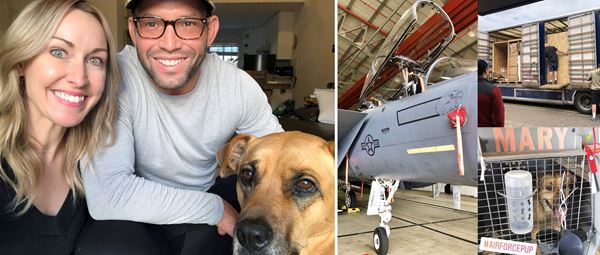Cresa employee spotlight: Malia Rosado
Cresa is committed to building an inclusive workplace that encourages, supports, and celebrates the diverse voices of our employees. Our employee spotlight series gives our team members the opportunity to share their unique experience.
Malia Rosado is a Senior Marketing Manager who writes content for Cresa’s Corporate Marketing team and provides pitch and proposal strategy for the Global Portfolio Solutions group. With over 15 years of marketing experience, Malia started her career in Boston and took it “on the go” after marrying her Air Force husband. She has been with Cresa for 5 years and currently lives in Redondo Beach, CA with her husband and pup.

Left: Working from home with my family.
Right: One of the F-15 Strike Eagles that routinely drowned out my conference calls and packing up the house (and pup) for our 4th international move in 6 years.
How did you get into the industry?
My marketing career initially started at Bovis Lend Lease (now Lendlease), a construction management firm in Boston. It felt like a huge detour from the career in journalism I had planned, but I met some really wonderful people there and quickly found opportunities to tell stories – albeit of a different kind – in my marketing role. From there I went on to another CM firm before finally transitioning to real estate.
I found my current role at Cresa through Alison Scott, Cresa’s Vice President of Global Marketing. Alison and I actually worked together at Bovis Lend Lease years before and became fast friends on an ill-fated work trip. She knew my experience well and thought I’d be of value to Cresa’s newly formed Global Portfolio Solutions group.
What are some challenges you have encountered during your career and how did you overcome them?
I’m a military spouse and this has definitely been my greatest career challenge. While in Boston I met my husband, an Air Force officer. Just after we were married, he was reassigned to Naples, Italy which meant leaving my family, friends and job behind. Living in Italy was wonderful but also really challenging because there were no employment opportunities available to me. It’s incredibly isolating to be far from home, struggling to learn and function in a new language without your support network. I’d always been financially independent and highly valued at work – suddenly my days lacked purpose.
While there’s no doubt active duty members make huge sacrifices, military spouses and kids are the unsung heroes of our armed forces. The average military family moves every 2-3 years, sometimes internationally. Something like 25-40% of military spouses are unemployed or severely underemployed due to that disruption – that’s a lot of talent being pushed out of the workforce.
I began working with Cresa while stationed in Middle Georgia – not exactly a hotbed of professional opportunity. By offering me a remote position, Cresa proved ahead of the curve, providing a legitimate opportunity to someone who was qualified but would have otherwise been overlooked because of their location.
Of course, there is no stasis in military life, so two years later when we got reassigned to the U.K. I was worried about losing my job. Again, Cresa was open-minded, offering to be flexible with me if I could be flexible about my hours when needed. And when we got reassigned to Los Angeles? Cresa happily welcomed me home to the States. It’s incredibly rare to find an employer this committed to retaining talent. For a military spouse, it’s almost unheard-of.
Even with this continued show of support, I still struggle with how honest to be with my colleagues. How can I convince them I’ll remain engaged with so much disruption in my personal life? How can they trust me with their projects and clients when I’ve moved 5 time zones away? And what about my career – can I expect job growth or should I just be lucky to have a job? I pride myself on building trust with my colleagues, but there are times I worry about being perceived as unstable because of our military lifestyle.
I experienced this uncertainty again this summer when my husband was tasked with a deployment to Afghanistan. Watching the Taliban gain ground every day while eyeing his impending departure date left my stomach in knots. It was hard to concentrate, and family time took on a whole new precedence. I shared this news with a few colleagues and, though it didn’t change anything per se, I felt seen and it provided some relief. Thankfully my husband’s deployment was cancelled just before Kabul fell, but like everything in the military: deployments are subject to change.
Where have you and your husband been stationed? How does changing your location affect your family and your work?
Since our first move to Italy, we have been assigned to Georgia, the United Kingdom and, currently, Los Angeles. People think of moving in terms of logistics – packing, a new address, new grocery store, new dentist – but it’s so much more than that and certain places definitely feel more like home than others. We loved being overseas and all the travel opportunities it affords. But being here at the beach isn’t so bad either!
In terms of work, usually the biggest shift for me is adjusting my working hours. Although, in the U.K., we lived on the Air Force base and my conference calls were regularly interrupted by the sound of fighter jets taking off overhead. That was annoying.
Why are you passionate about what you do?
In my role, I listen to the ideas of each team member and develop cohesive messaging that reflects our collective insights. There’s something gratifying about helping people clearly articulate their thoughts. Whether I do it on paper to create marketing collateral or verbally to help frame a pitch strategy, it’s the storytelling aspect of marketing that appeals to me.
Are there any projects or contributions to your local Cresa office, that you would like to share?
Since joining Cresa, I’ve worked with the Corporate Marketing and the Global Portfolio Solutions teams. Each of these teams present opportunities to connect and collaborate with local offices and service line leads around the world. Projects and pursuits tend to blur, so I’m most proud of the connections I’ve built with my colleagues.
What organization(s) are you currently involved with?
Getting and staying involved with an organization has definitely been more challenging since becoming a military spouse. These days I tend to focus on my immediate Air Force community. So often people think of service as an extracurricular activity that requires a lot of your limited free time. This is not the case, and it’s important to remember the impact of little kindnesses that alleviate pressure for those around you. In recent years, I’ve been more inclined to babysit for a tired mom when her husband is deployed, grocery shop for families in quarantine, care for someone’s pet when they cannot, or write a resume for a spouse struggling to find employment. It’s not the kind of stuff you add to your LinkedIn profile, but I find it rewarding.
The military community is small and intimate. Our struggles are unique and often go unnoticed by non-military, so it’s important we take care of each other.
Why is their mission important to you?
Helping others in the military community is important to me because I see their sacrifices first-hand. Moms and Dads become single parents during deployments, kids move their senior year of high school, birthdays and holidays are spent apart from loved ones – it’s a heavy lift. Even our poor pup, Mary, has made several long-haul flights in the plane’s cargo hold for international moves. Everyone sacrifices – and just when life stabilizes, you’re asked to do it again.
What has your experience as a military spouse taught you?
Accept help. Pack light. Invest in experiences (because your stuff will get dinged up in the move anyway). “It’ll be fine.”
How do you think we can better promote DIB within the CRE industry?
I’m convinced remote work can drive diversity efforts and create better outcomes for businesses and employees. If businesses want creative solutions for their clients, they need to attract and retain the best talent – not just the best talent in a 30-minute radius. Remote work isn’t a perk, it’s an equalizer.


